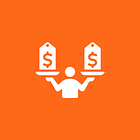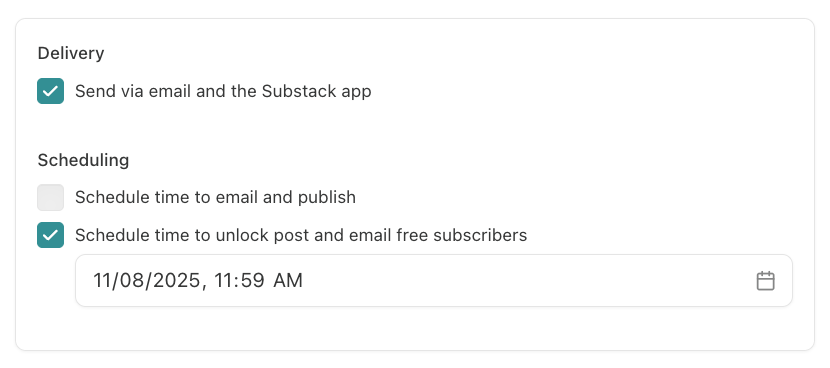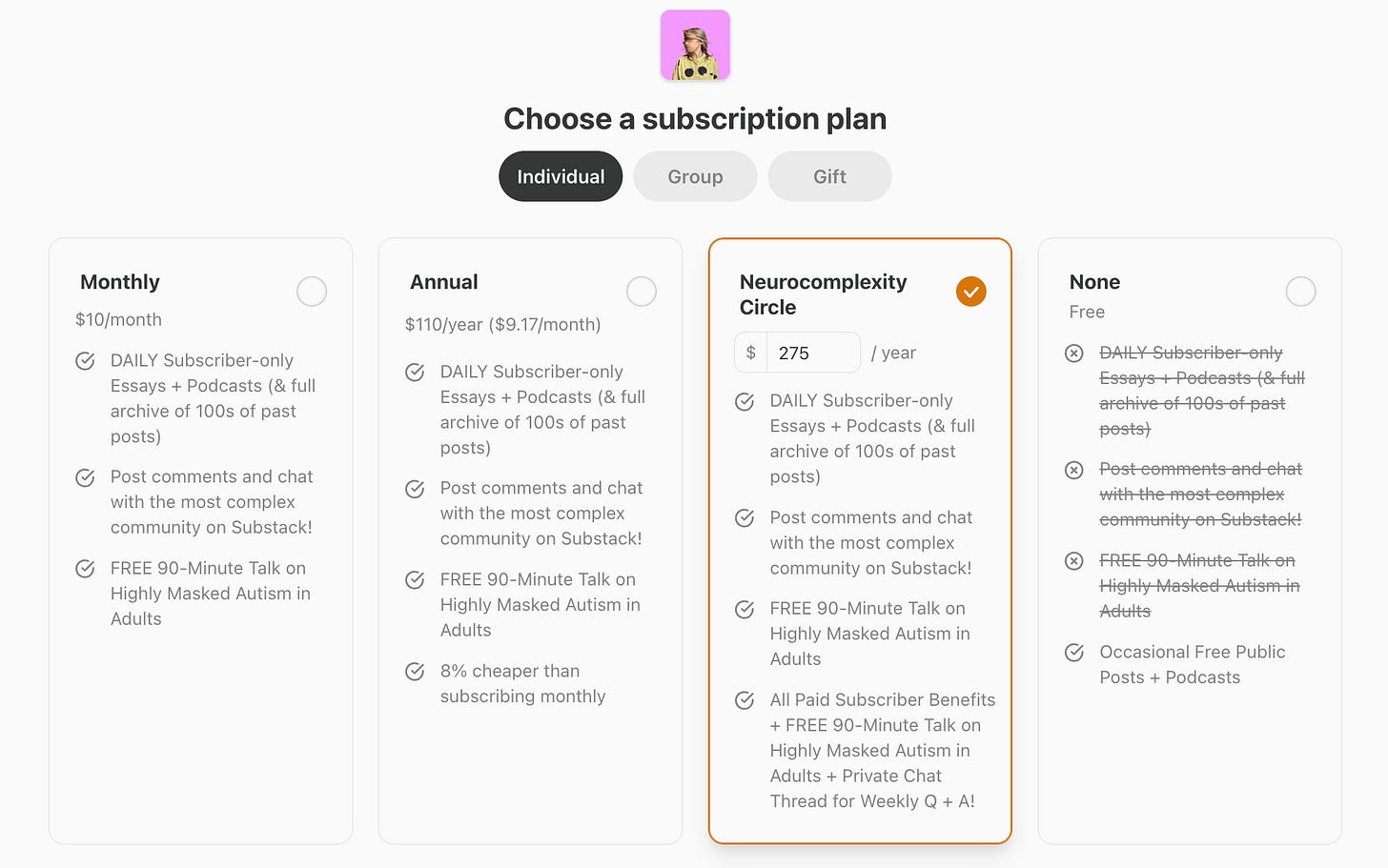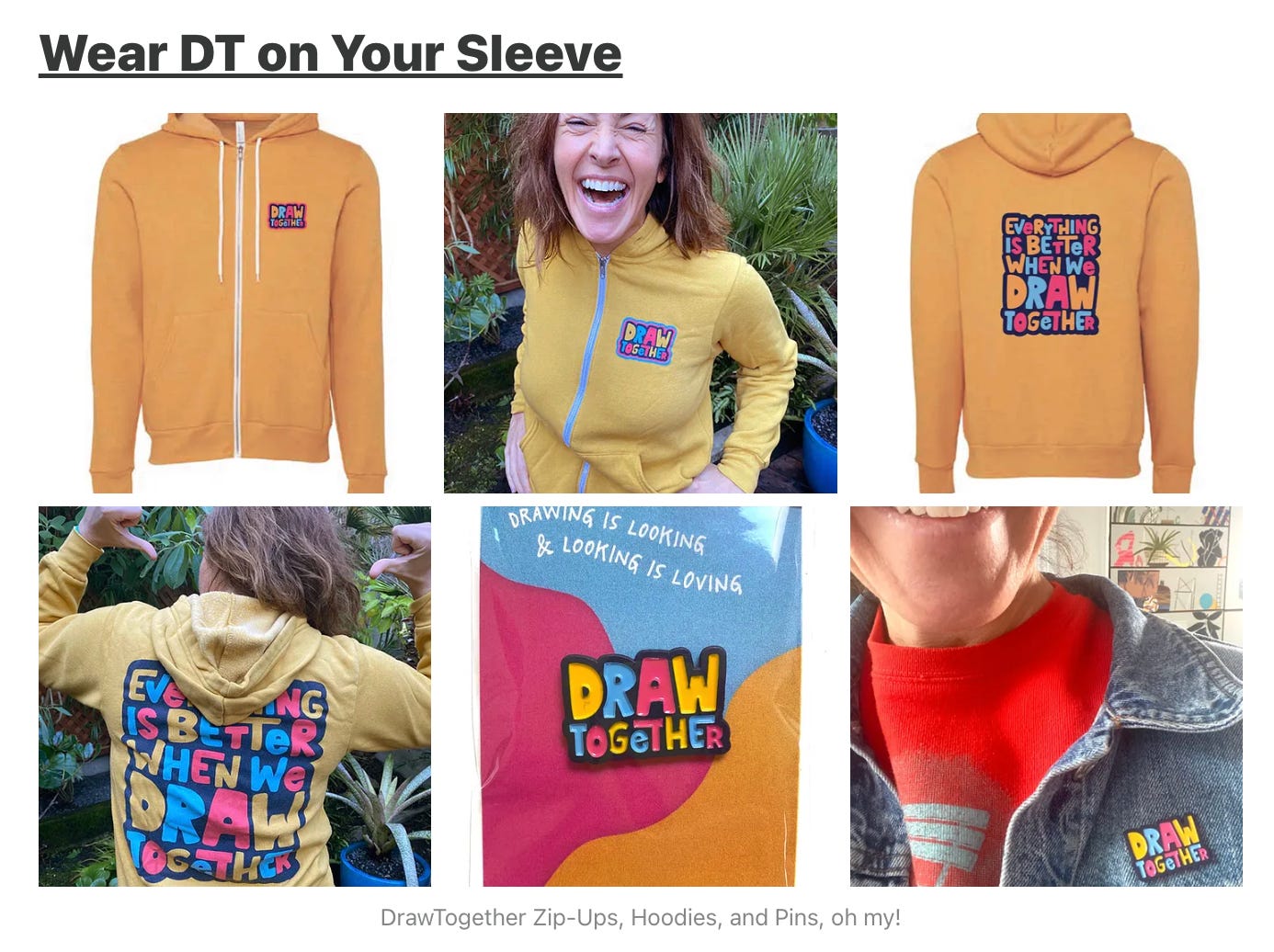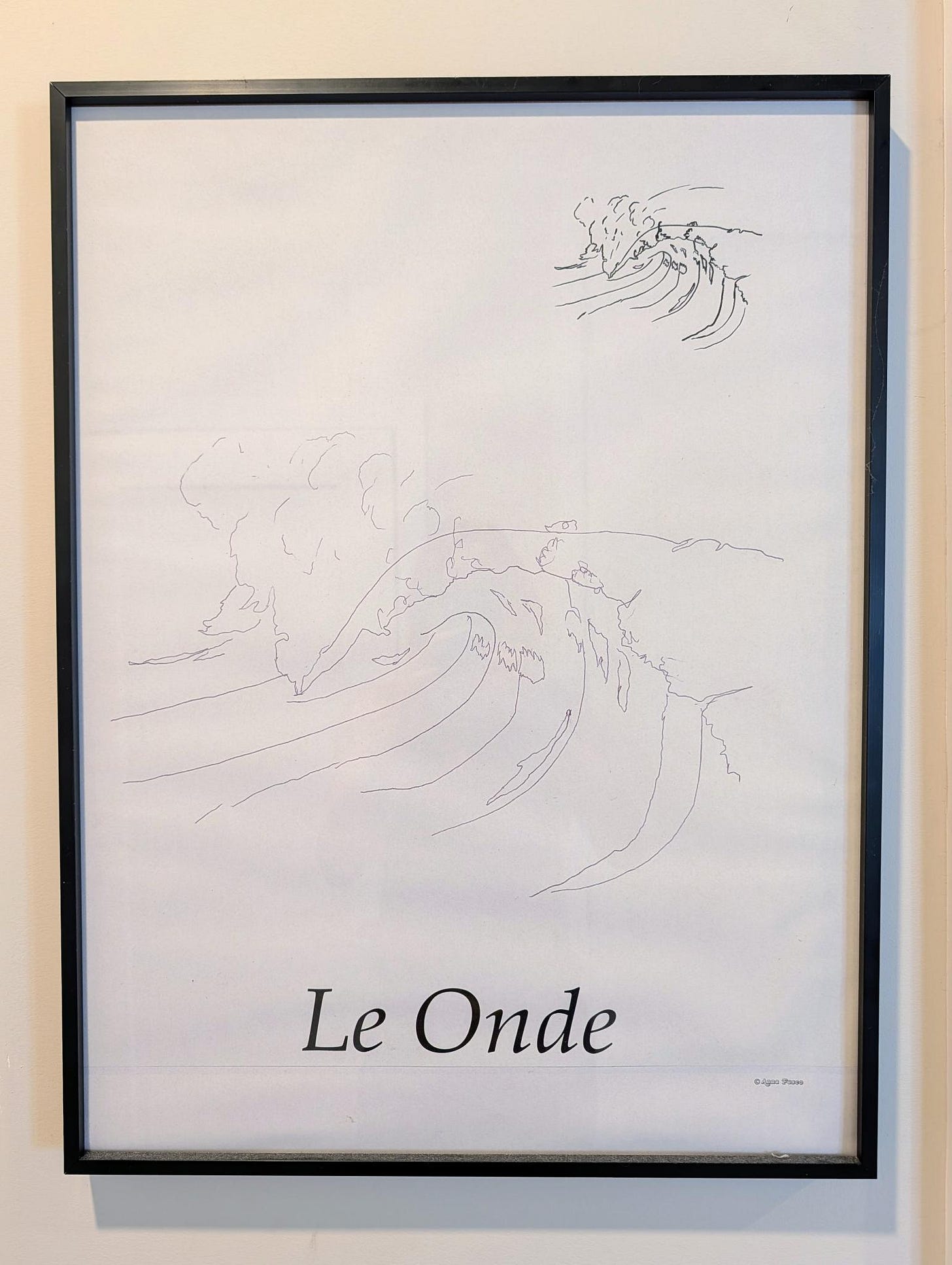11 Types of Perks for Paid Subscribers on Substack
A guide to the most effective subscriber rewards that grow your revenue and keep readers coming back.
✨ New: The Substack Creator OS is here!
A complete Notion workspace for running and growing your Substack like a pro.
Publish more consistently with a streamlined content pipeline that eliminates chaos and guesswork.
Grow faster by turning your ideas, posts, and outreach into a clear, trackable growth system.
Increase your revenue with built-in tools for managing sponsors, products, and your paid subscriber strategy.
Right now, it’s free for Premium subscribers.
The creators who win on Substack don’t just publish more; they build a paid tier so valuable that it sells itself.
This guide breaks down the 11 types of perks that drive revenue and retention. Perks give your paid tier a clear reason to exist and turn casual readers into committed supporters.
To find out what actually works, I analyzed hundreds of top-earning Substacks and cataloged every perk they offer. From this, I identified 11 common types of paid perks and how frequently top creators use each one.
This guide breaks down those categories with real examples and ideas to help you design a paid tier people are excited to join.
How Do Substack Paid Subscriptions Work?
Substack supports three plan types for most publishers:
Monthly Plan: This is the most flexible option, allowing subscribers to pay month-to-month for a set of paid subscriber perks. It’s perfect for people who want to explore your paid content before committing long-term.
Annual Plan: Subscribers can also choose to subscribe for a year at a time. Most publishers offer a discount off the monthly price to incentivize adoption of the annual plan and reduce churn. Some publishers also offer unique perks to annual subscribers to further minimize churn, but these must be delivered manually since Substack doesn’t support differentiating perks between annual and monthly subscribers.
Founding Member Tier: This is the highest level of support. It’s intended for our most loyal and generous readers who want to make an extra contribution. This tier often includes all the perks of the Annual plan, plus an extra special reward (like a one-on-one consultation, exclusive merchandise, or significant recognition) to acknowledge their profound support. This plan is optional and many publishers choose not to offer it.
To deliver these perks, Substack provides built-in access levers. These include the ability to paywall individual posts, grant exclusive access to Substack Chat, and send automated welcome emails to paid (monthly or annual) and founding subscribers. This functionality allows creators to deliver a mix of content, community, and direct communication perks across their tiers.
Creators control their offers, setting their own Substack publication prices for each tier and choosing which perks to include.
11 Paid Subscriber Perk Types
My analysis uncovered 11 different types of paid perks. I’ll explain each one and share examples below.
1. Content
The most common perk paid subscribers get is access to exclusive content. Whether it’s extra essays, behind-the-scenes updates, or podcast episodes, paid subscribers expect something they can’t get for free.
97% of top publications use content as their primary paid perk, while a small minority make all posts free and focus their paid tiers on community or other rewards instead.
Here are the most common ways creators structure and paywall their content.
Long-Term Access: Content Goes Behind a Paywall After a Set Period
Some writers start with all of their content free and later place some of it behind a paywall. This means that to continue accessing their entire archive, subscribers need a paid subscription.
For example, I noticed this disclaimer on one of David McIlroy’s articles a while ago. At the time, it was fully accessible, but now it’s mostly behind a paywall.
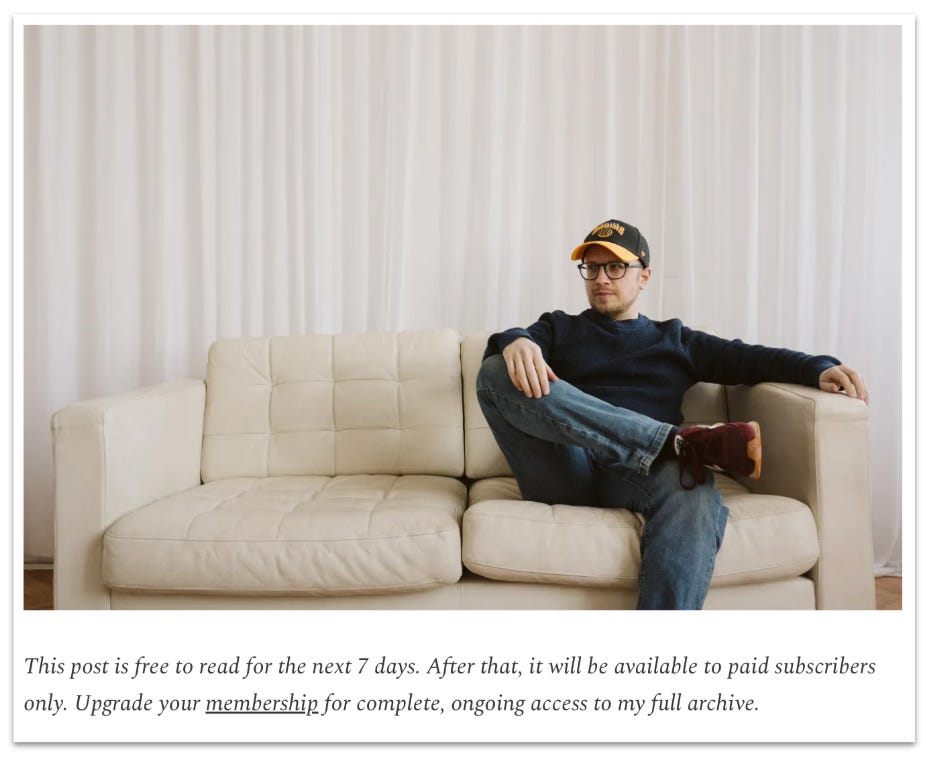
This type of content paywall strategy works best for evergreen content that remains valuable for a long time after publication.
If you want to try paywalling after a set period, you can easily automate this from your Substack publication’s dashboard. Visit Settings → Payments → Paywalling, toggle on Auto-paywall older posts, and select your timeframe.
Early Access: Content Starts Behind a Paywall and Becomes Free Later
Some writers start with content behind a paywall that becomes free after a certain date. This means that paid subscribers get early access to everything they publish.
If you want to unlock your paid content after a certain date, you can manage this on a post-by-post basis in your scheduling settings. When you’re ready to publish a post, click Continue, scroll down to Scheduling, click “Schedule time to unlock post and email free subscribers,” and choose the date you want the post to unlock.
Full Access: Content is Always Behind a Paywall
Some writers don’t change their content's status and instead keep a portion of it permanently behind a paywall. This means paid subscribers pay to access the full archive at any time.
This is typically what I do for Really Good Business Ideas. Most articles include a preview section where I provide value to free subscribers and a clear overview of what to expect behind the paywall, followed by a paywalled section that provides additional value to Really Good Business Idea Premium subscribers.
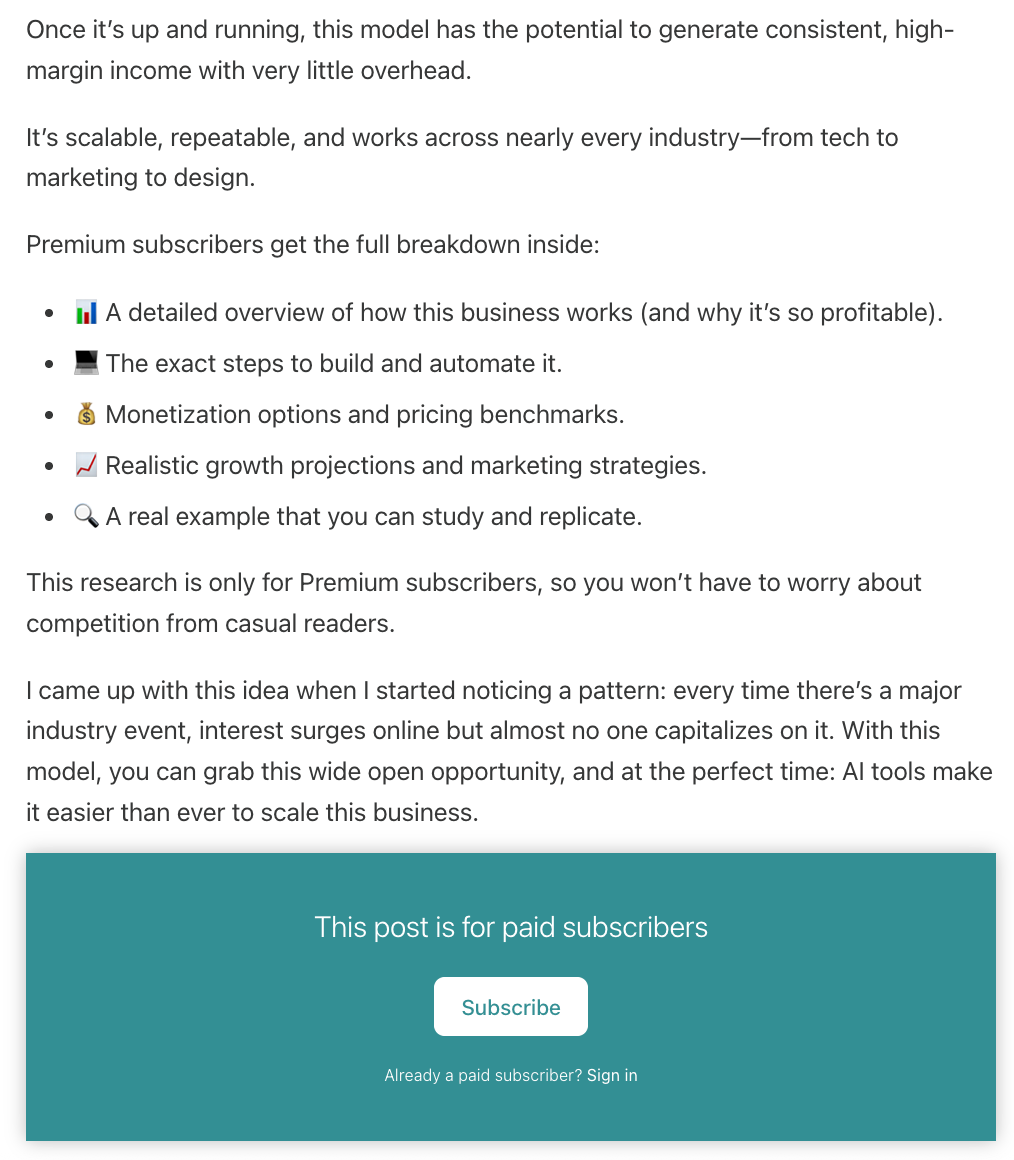
2. Community
71% of top publications include some form of community access for paid subscribers: a space to connect, ask questions, or interact directly with the creator.
Most of these communities live on Substack through native features, but many creators extend the experience to other platforms to offer a richer experience.
Substack Community: Comments and Paid Subscriber Chats
Most community perks take place on Substack, where community features are naturally integrated. It’s very common for publications to limit post commenting to paid subscriptions, which can be particularly useful for publications that publish more vulnerable or controversial content and want to keep the comment section relatively friendly.
Many publications also take advantage of Substack's native subscriber chat features, where the ability to start or participate in threads can be limited to paid (or even just founding) subscribers.
For example, the Marketing Ideas subscriber chat is only available to paid subscribers. Author Tom Orbach also hosts a live Q&A weekly, giving community members an exclusive chance to engage directly with him.
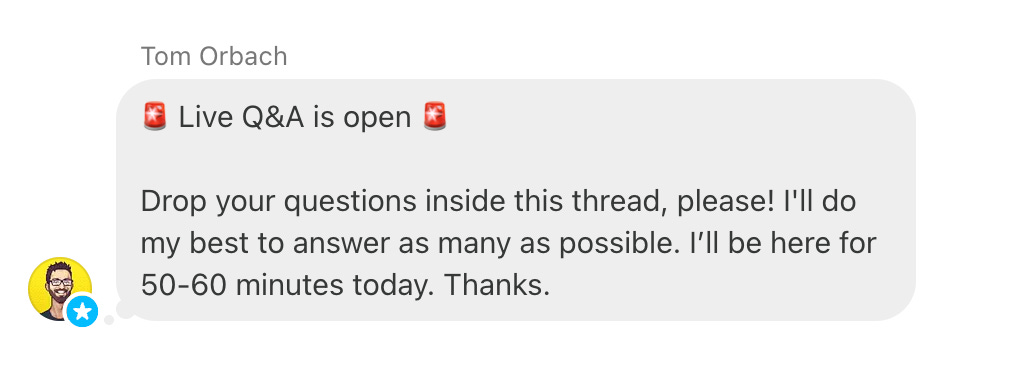
Off-Substack Community: Slack, Discord, and More
Besides the convenient native integration, Substack’s community features are generally quite limited, particularly since there is no option to create different channels or rooms for different topics. Many publications opt to host their communities on other platforms instead. Slack, used by Lenny's Newsletter, and Discord, used by Drop Site News, are among the most common options.
3. Access
The third most common paid perk is special access. This can take many forms, such as direct access to the creator (like the ability to email or DM them) or early access to new products, events, and drops.
31% of top publications offer some kind of access perk, but how they structure it varies widely. Some creators use it to deepen connection; others use it to reward loyalty or offer exclusive opportunities to their most engaged readers.
Feed Me: “My phone number if you’re nice”
The Ankler.: “Early access to event invites and merch drops”
The Parnas Perspective: “A personal note from me!”
The Honest Broker: “Email me directly”
The Contender: “Early access to my next book”
SubMakk: “I’ll email you a deleted scene from The Great Believers”
Access is also part of my offer to Really Good Business Ideas Premium members. I get too many messages across platforms like Substack and LinkedIn and don’t have the time to go through them all. But with Substack, I can make sure messages from premium subscribers always land in my primary inbox, so they can DM me for help anytime and I can be sure to respond promptly!
4. Intrinsic Reward
Believe it or not, the fourth most common perk among top publications is no perk at all.
26% of creators supplement their paid offer with an intrinsic reward: the satisfaction of supporting something meaningful. Sometimes that means directly supporting the creator and their work; other times, it’s about extending that impact to a related cause or community in need.
Intrinsic reward is offered as a paid perk across all paid tiers, but it is slightly more common at the founding level, where it is often the only point of differentiation for people who want to/can pay more.
Supporting the Publication Author
The Generalist: “Support our growth, bask in eternal glory”
Gayety: “Support Gay and LGBTQ+ Media”
Chartbook: “The best karma.”
Volts: “Watch as Dave sheds literal tears that you’re so nice”
Helping Others Access Content
Emily Writes Weekly : “By paying you allow many posts to be free to all”
Your Local Epidemiologist: “Keep YLE’s reliable, research-backed science freely available to all”
Third-Party Donations
While the intrinsic rewards usually come from supporting a writer or helping to make their work accessible to more people, sometimes it also comes from financially supporting a cause you believe in through your subscription.
The Hotshot Wake Up: “Monthly subscriptions go towards Wildland Firefighter donations and support the content.”
5. Live Events
Live events are a paid perk for 19% of top Substack publications. These can take many forms, from workshops and AMAs to virtual meetups and in-person gatherings, giving subscribers a chance to connect directly with the creator and the community.
Whether online or offline, these events deepen engagement and make the subscription feel more personal and participatory.
Online Events
Most events offered as paid Substack perks take place online.
The Quiet Life with Susan Cain: “Join our candlelit monthly gatherings: with author interviews, exercises, and magical, introvert-friendly chemistry.”
Our Best Jackett: “Monthly live classes & full class audio archive”
Blocked and Reported: “Access to live video chats”
In-Person Events
Some publications also offer in person events for paid subscribers who can make it.
The Gardening Mind by Jo Thompson: “Real-life meet-ups in gardens”
SpyTalk: “Drinks on me in DC!”
6. Digital Product
About 16% of top publications offer digital products as part of their paid tiers: ebooks, templates, courses, or downloadable resources.
These perks work especially well for creators who teach, curate, or share expertise. They add a practical layer of value that subscribers can save, reference, and return to over time.
Ebooks, Templates, and More
Ebooks and other file-based digital products are some of the most common digital product perks. From the publisher’s side, they make a great perk because once they are created, there is typically no extra cost to keep distributing them.
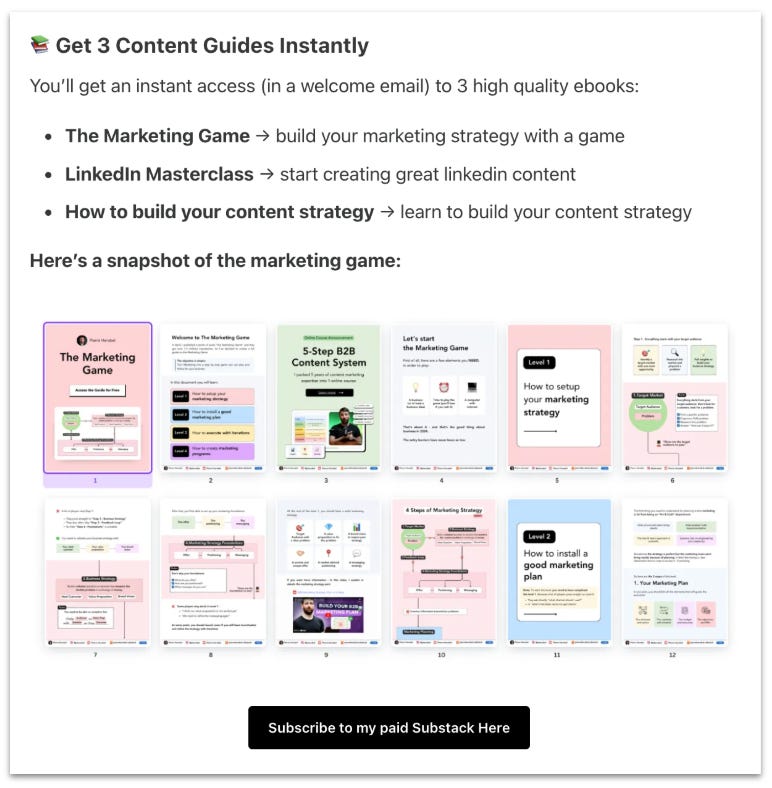
Courses & Lectures
Some publishers also develop courses for their paid subscribers. These are typically more robust than a single downloadable file because they incorporate video content or access to educational platforms like Thinkific.
For example, Lindsey Mack's Substack offers founding tier subscribers access to a 90-minute talk on autism.
Directories & Job Boards
Many publications also develop directories and job boards that are only available to their paid subscribers.
Karo (Product with Attitude) gives paid subscribers the opportunity to list their products on Stackshelf, a Substack marketplace.
The Freelance Writing Network gives paid subscriptions access to paid writing opportunities.
The Substack Bookstore gives paid subscribers additional opportunities to list their books in their digital bookstore (free subscribers can only list one book) as well access additional promotional support.
Top CS Jobs curates the best jobs in customer success roles for paid subscribers.
7. Physical Products
Physical products are part of the paid tier for 13% of top Substack publications. These perks often include branded merchandise, books, or other tangible rewards that help subscribers feel like part of the publication’s world.
Because physical perks require more effort and cost to produce, they’re most effective at higher tiers where they can serve as collector’s items, thank-you gifts, or limited-edition rewards for your most loyal supporters.
Here are a few examples of physical product perks I’ve come across.
A Book (Especially a Signed Copy)
Many Substackers are also published book authors (or in the process of writing their first book), so this is one of the most common physical product perks on offer to paid subscribers. JP Castlin, author of Strategy in Praxis, promises founding members a signed copy of his upcoming book when it’s published.
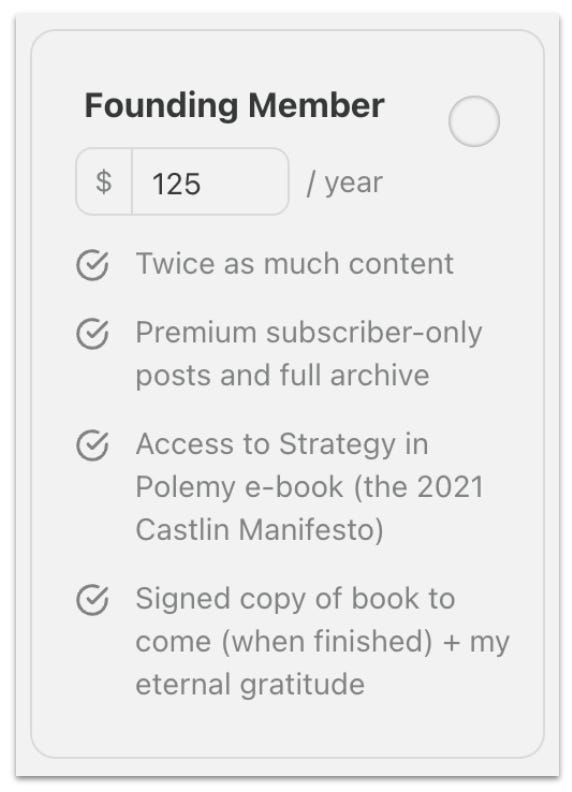
Branded Merch
Many publications offer branded merch as part of their founding tier. For example, DrawTogether promises to mail merch to founding members, who pay $500/year.
Owned Products
Sometimes, Substack publications create or sell products outside their publications that are then used as perks. Sky Fusco , author of Unsupervised, offers founding members a print from her art shop for free. This is the one I ordered through my founding membership perk a couple of years ago!
8. Discounts
Discounts are used as a paid perk by 9% of top Substack publications. These often include subscriber-only promo codes or ongoing discounts on products, services, or events.
Some creators extend these perks beyond their own offerings, partnering with brands or businesses to give subscribers exclusive deals. When done well, discounts add real monetary value to a paid tier and help strengthen relationships with aligned partners.
Lenny Rachitsky offers discounts to 15+ partner tools that are likely to appeal to readers. As is common with third-party discounts, this perk is only available to annual subscribers, which prevents people from subscribing for one month to get the discounts and then immediately cancelling afterwards.
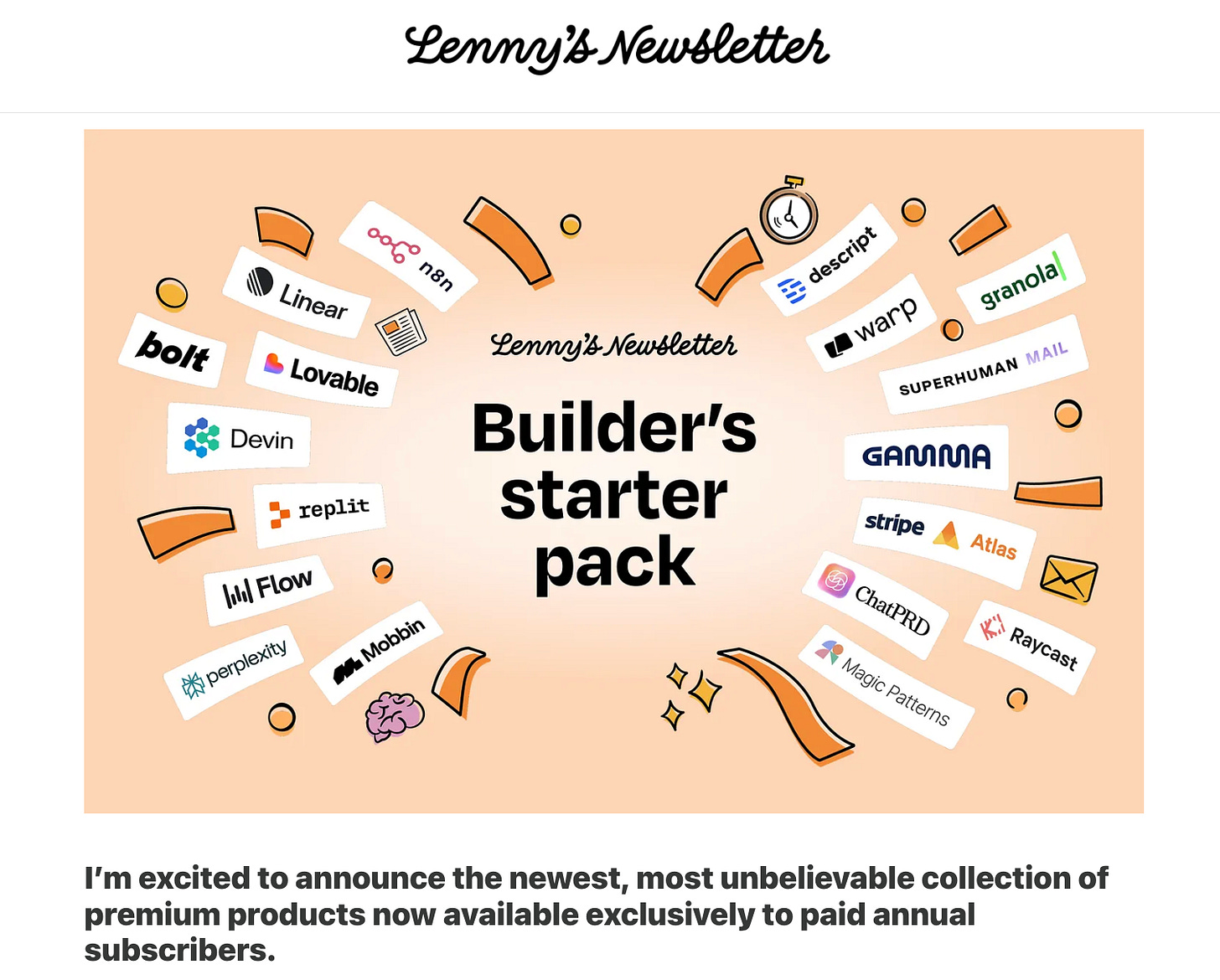
Many Substack publishers also offer discounts on their own products and services. This is more often available to both monthly and annual subscribers, since they will still collect sales revenue even if the subscriber cancels their subscription immediately.
9. Services
6% of top Substack publications offer services as a paid perk. These usually include personalized offerings like one-on-one coaching, editing, audits, or consulting, often framed as premium upgrades for the most engaged subscribers.
Because they require the creator’s direct time and expertise, service perks work best at higher tiers like annual subscribers or founding members. They’re a smart way to blend audience engagement with your specialized skills to increase conversion and subscription revenue.
Sometimes services can be offered at multiple tiers. For example, all Really Good Business Ideas Premium subscribers can book 15-minute office-hour consultations, but only VIP Members (what I call my founding tier) can book two full one-hour consultations every year.
Similarly, Mad About The House by Kate Watson-Smyth offers monthly design clinics for all paid subscribers, while founding subscribers can also book a 45-minute one-on-one design consultation.
10. Gift Subscriptions
Gift subscriptions are offered by 2% of top Substack publications. This perk allows paying subscribers to gift additional subscriptions, letting them share your publication directly with people they know.
It’s a subtle but effective way to reward loyal readers while expanding your audience organically. Each gifted subscription turns a supporter into a small-scale ambassador for your work.
This perk is most common with founding-level subscriptions. It’s something I offer my VIP members (my founding tier), and it’s also part of the founding tiers for The Bulwark and The Cottage.
11. Social Capital
Social capital perks are used by 2% of top Substack publications. These usually take the form of public recognition, like shoutouts, name mentions, or contributor credits that give paid subscribers visible appreciation for their support.
They work especially well for community-driven publications, where recognition strengthens belonging and signals status within the group. Even a small gesture, like featuring names in a post footer or thanking top supporters in a newsletter, can make readers feel seen and valued.
For example, the only difference between the regular paid subscription and the founding-level paid subscription for Blocked and Reported is that founding subscribers receive a monthly shoutout.
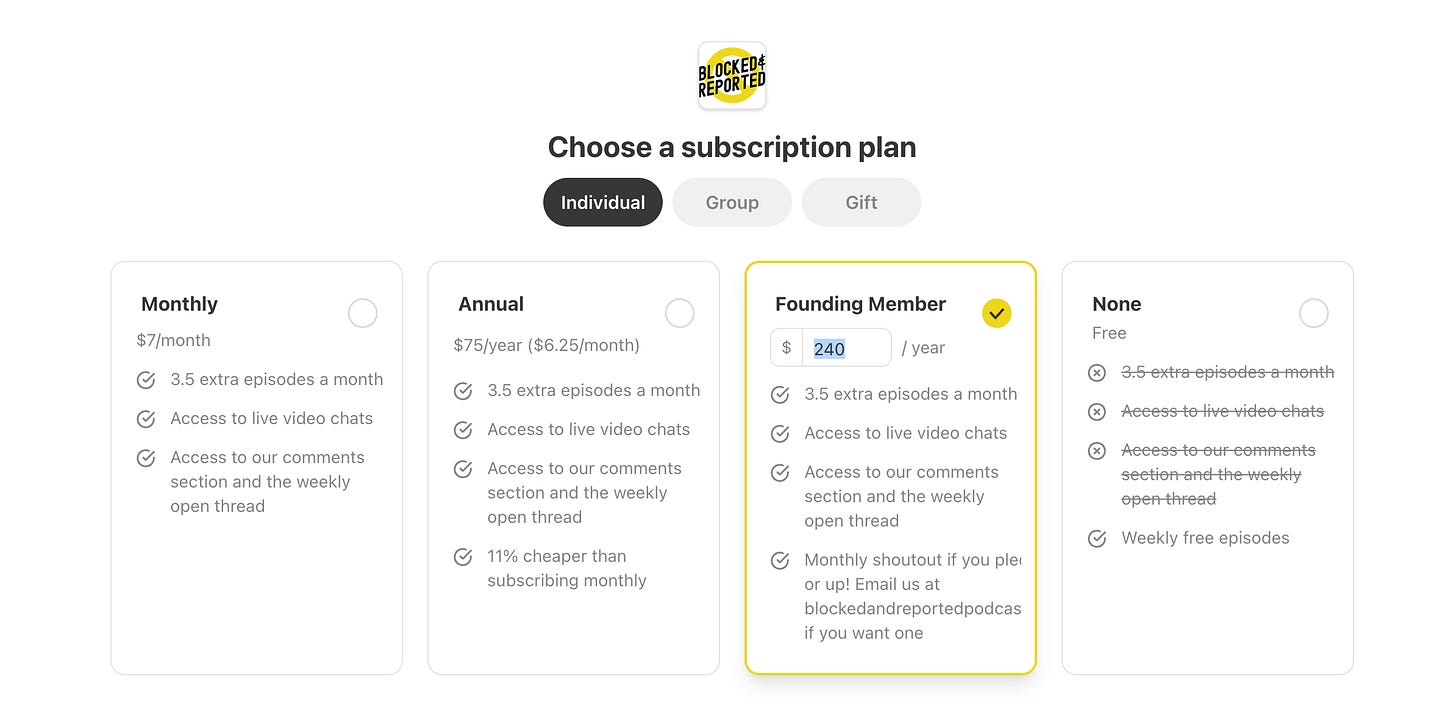
Another publication, Alphabet Soup , offers a more unique version of a shoutout. They promise to name a problematic character in a future story after founding members!
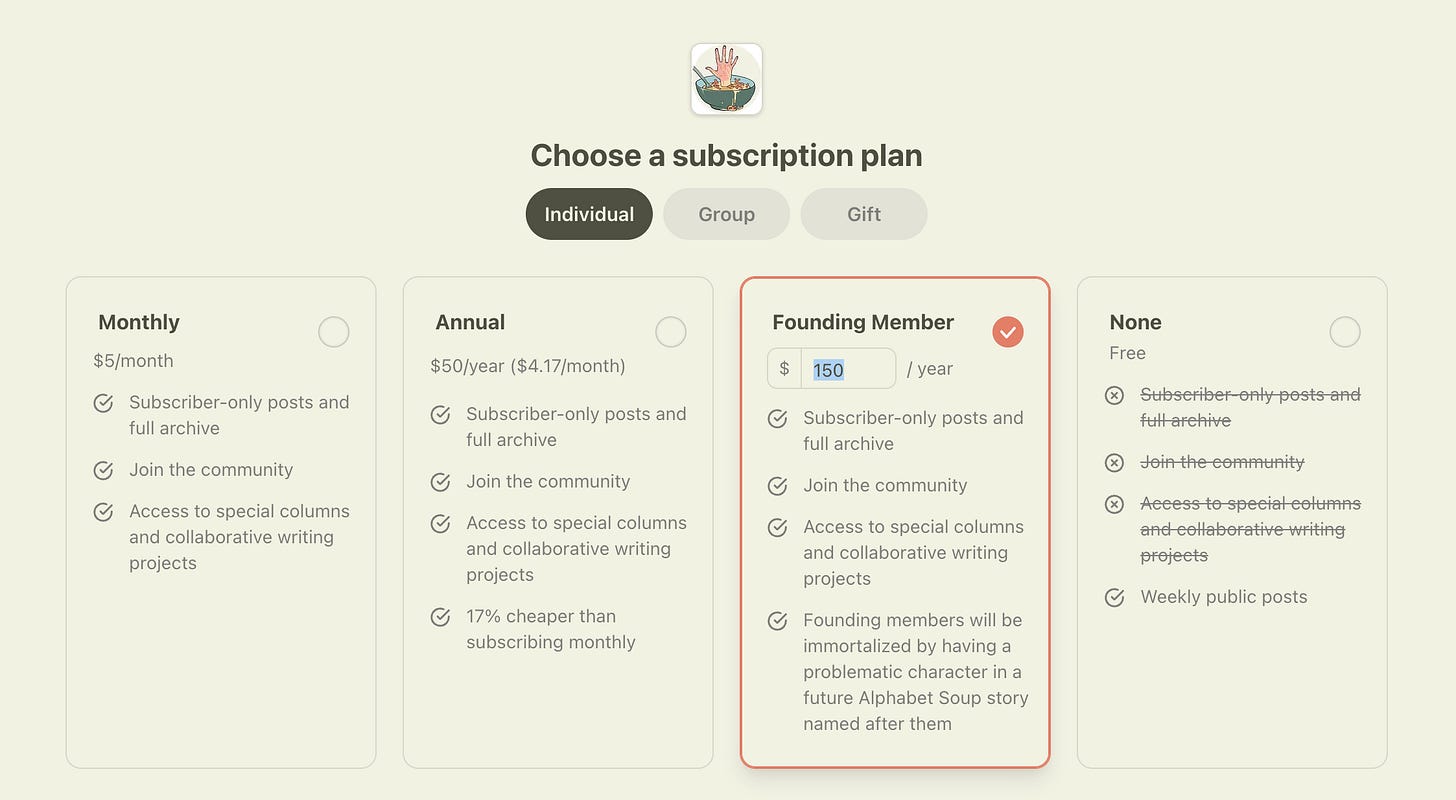
The most successful Substack publications don’t just publish content; they create value beyond the inbox.
Top-earning creators grow and retain their paid audience by strategically combining 11 distinct types of perks across their subscription tiers. Engaging content is table stakes for most publications, but other perks give publishers ways to differentiate and really stand out. The best mix of perk types will depend on your own skills, goals, and what your audience wants or needs.
🎁 Premium Bonus: Paid Perks Database
Want to see what perks the biggest Substacks are offering their paid subscribers? This database includes 500+ real examples, organized by Substack category, paid tier, and perk type, plus access to pricing info and screenshots from each publication’s upgrade page.



